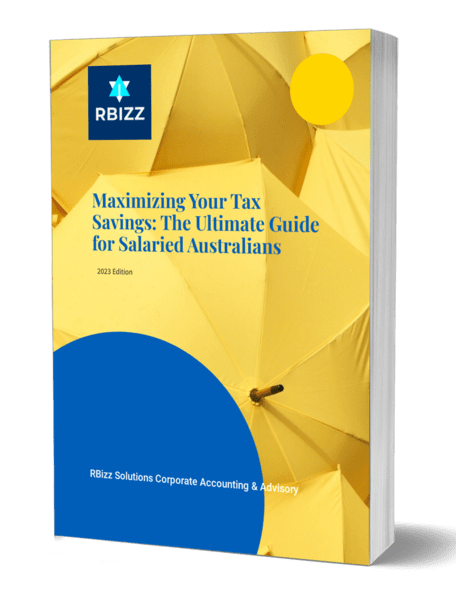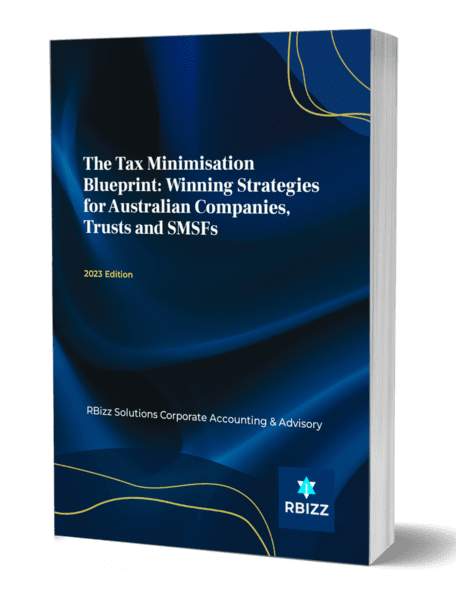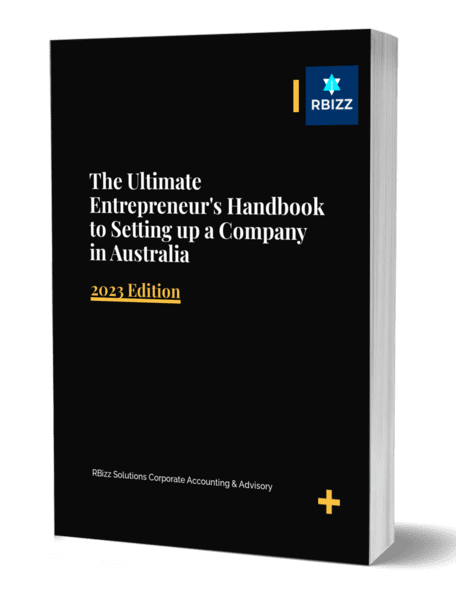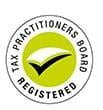Our Latest E-books On Taxation & Business
The Tax Minimisation Blueprint : Winning Strategies for Australian Companies, Trusts and SMSFs
How To Register A Company In Australia?
1. Choose a name for your company
2. Decide on the rules that will govern your company
3. Identify who will be shareholders, directors and officeholders
4. Decide on the share structure
5. Obtain consent from officeholders, members and occupiers
6. Register with ASIC
7. Get necessary registrations including TFN, ABN, GST and PAYG
How Easily Can We Set-Up Your Company?
1. Give your information online
2. Pay online
3. We review information
4. We register your company, prepare constitution, minutes & resolutions
5. We send your documents for your online signatures
6. Once signed, you will receive signed documents electronically instantly
What Is Included?
1. Phone Advisory
2. Certificate of incorporation from ASIC
3. Company Constitution
4. Share Certificates
5. Minutes
6. Resolutions
7. Online Signatures
8. TFN
9. ABN
10. PAYG
11. GST
12. Unlimited ASIC Agent Services for 1 Year for the new company
13. Advice for the next steps
14. Email Support
1. Phone Advisory
2. Certificate of incorporation from ASIC
3. Company Constitution
4. Share Certificates
5. Minutes
6. Resolutions
7. Online Signatures
8. TFN
9. ABN
10. PAYG
11. GST
12. Unlimited ASIC Agent Services for 1 Year for the new company
13. Advice for the next steps
1. Phone Advisory - N/A
2. Certificate of incorporation from ASIC
3. Company Constitution
4. Share Certificates
5. Minutes
6. Resolutions
7. Online Signatures - N/A
8. TFN
9. ABN
10. PAYG
11. GST
12. Unlimited ASIC Agent Services for 1 Year for the new company - N/A
13. Advice for the next steps
14. Email Support
1. Phone Advisory - N/A
2. Certificate of incorporation from ASIC
3. Company Constitution
4. Share Certificates
5. Minutes
6. Resolutions
7. Online Signatures - N/A
8. TFN
9. ABN
10. PAYG
11. GST
12. Unlimited ASIC Agent Services for 1 Year for the new company - N/A
13. Advice for the next steps
How Long Does It Take To Set Up A Company?
Top 100 Questions You Need To Know Before And After Setting-Up a Company in Australia
Top 50 Questions You Need To Know Before Setting-Up a Company in Australia

Starting a business in Australia involves several steps and considerations. Here's a simplified step-by-step guide:
Business Idea and Plan: Begin with a strong business idea. What are you going to sell or what service will you provide? Research the market to ensure there's a demand for your product or service. After you have your idea, you should create a business plan that outlines your goals, target market, and strategies for reaching your target market.
Legal Structure: Determine the legal structure of your business. You may operate as a sole trader, partnership, company, or trust. Each has different legal, tax, and financial implications.
Business Name: Choose a name for your business. The name must not be in use or too similar to an existing name. You can check the availability of a business name on the Australian Securities and Investments Commission's (ASIC) website.
Registration: Register your business. This includes getting an Australian Business Number (ABN), registering your business name, and if applicable, registering for Goods and Services Tax (GST).
Licenses and Permits: Depending on the nature of your business, you may need specific licenses or permits to operate. These can range from food business licenses to real estate licenses. Check with local, state, and federal governments to ensure you have the necessary permits.
Bank Account: Open a separate bank account for your business to keep your personal and business finances separate.
Insurance: Depending on your business type, consider what kinds of insurance you may need. This could include public liability insurance, professional indemnity insurance, or workers' compensation if you plan to hire employees.
Record Keeping: Set up good record-keeping systems to track your income and expenses. This is important for tax purposes and will make your life easier at tax time.
Business Location: Decide where you want to operate your business. This could be a physical location like a store or office, or an online location.
Hiring Employees: If you plan to hire employees, you will need to familiarize yourself with Australia's labor laws, including minimum wage, leave entitlements, and superannuation.
Marketing and Launch: Develop a marketing strategy to attract customers to your business. This could involve social media marketing, traditional advertising, or search engine optimization. Once everything is in place, you can launch your business!
To register a company in Australia, you need to go through the Australian Securities & Investments Commission (ASIC). The process involves:
- Choosing a company name.
- Deciding on the rules that will govern your company (replaceable rules, constitution, or a combination of both).
- Identifying your officeholders and their roles.
- Deciding on the share structure.
- Obtaining consent from officeholders, members, and occupiers.
- Registering with ASIC and paying the registration fee.
Detailed information on each of these steps can be found on the ASIC website www.asic.gov.au.
Except government fee, there is no fixed cost. You can see our costs in the above section.
However, this is just the cost of registration. You should also factor in other costs such as legal advice, accounting fees, business licensing, insurance, and lease or purchase of a business location.
Legal requirements for starting a business in Australia include:
- Registering your business name with ASIC.
- Applying for an ABN.
- Understanding the taxes you'll need to pay (income tax, GST, payroll tax, etc.).
- Complying with employment laws if you're planning to hire staff.
- Understanding industry-specific regulations, licenses, and permits.
For detailed information, you can refer to the Australian Government's business website www.business.gov.au.
While it's not a legal requirement to have a lawyer when starting a business in Australia, it can be beneficial. Lawyers can provide guidance on business structure, help draft and review contracts, assist in lease agreements, ensure you're complying with all regulations, and protect your intellectual property.
A real-world example would be a small tech startup that developed a unique software solution. By consulting a lawyer early on, they were able to secure a robust patent for their software, which later played a crucial role in negotiations when they were approached by a larger company for acquisition.
To register a business name in Australia, you must first check its availability on the Australian Securities and Investments Commission's (ASIC) website. If the name is available, you can register it with ASIC, for which there is a small fee. The process can be done entirely online on the ASIC's website.
For example, if you're starting a cafe called "Sydney Sips", you need to check this name isn't already in use by someone else. If it's available, you can register it for 1 or 3 years, and it will be yours to use during that time.
A business plan is a formal written document that includes your business goals, the methods you will use to achieve them, and the timeframe in which you plan to achieve your goals. It also typically includes information about your target market and competition.
In Australia, a business plan typically includes the following sections:
- Executive Summary: An overview of your business and your plans.
- Market Analysis: A look at your industry and the market in which you'll operate.
- Company Description: Detailed information about your company and what it does.
- Organisation and Management: Your business structure and management team.
- Service or Product Line: What you're selling or the service you're providing.
- Marketing and Sales: How you'll attract and retain customers.
- Funding Request: If you're seeking funding, include your funding request here.
- Financial Projections: Your predictions about your future finances.
- Appendix: An optional section that includes résumés and permits.
You can find templates and further assistance on creating a business plan on the Australian Government's business website.
Businesses in Australia have various tax obligations, which can include:
Income tax: Businesses must lodge a tax return annually and may pay tax on their income. The amount is determined by your business structure; for example, companies are subject to the company tax rate, which currently is 25%.
Goods and Services Tax (GST): If your business's annual turnover is over a specific threshold, currently $75,000 as of my knowledge cutoff in September 2021, you'll need to register for and pay GST.
Pay As You Go (PAYG) withholding tax: If you have employees, you need to withhold tax from their wages and send it to the Australian Taxation Office (ATO).
Fringe Benefits Tax (FBT): This is a tax employers pay on certain benefits they provide to their employees.
Payroll Tax: This state-based tax is imposed on businesses that pay wages above a certain threshold.
The type of insurance your business needs depends on the nature of your business and the level of risk. Some common types of business insurance include:
- Public liability insurance: Covers your business if a customer or a member of the public suffers a loss or injury because of your business activities.
- Professional indemnity insurance: Important for businesses that provide professional advice or services. It protects you against legal costs and claims for damages.
- Workers' compensation insurance: Mandatory if you employ people. It covers your employees if they get injured or sick because of work.
- Property insurance: Covers your business premises and its contents against damage, theft, or loss.
- Product liability insurance: Relevant if your business makes, sells, or supplies products. It protects against claims if a product causes injury or property damage.
- Cyber insurance: Relevant for businesses with a digital presence. It covers against damages caused by cyber attacks, data breaches, etc.
You should consult with a trusted insurance broker to identify the appropriate insurance coverages for your business.
The best structure for your business depends on various factors like the size and type of your business, the level of control you want, your business risk, and your tax obligations. Here's a brief overview:
Sole trader: This is the simplest structure where you're the sole owner and have full control over the business. But you're personally liable for all aspects of the business.
Partnership: This is when two or more people or entities run a business together but not in the form of a company. Similar to a sole trader, but liability is shared among partners.
Company: A legal entity separate from its shareholders. It provides limited liability, but it's more complex and costly to set up.
For more information, you can refer to the Australian Government's business website or consult with a trusted legal or business advisor.
The permits required to operate a business in Australia depend on the type of business, the business activities, and the state in which you operate. Commonly required permits can include:
- Building and planning permits
- Food business permits (for businesses involved in the preparation and sale of food)
- Liquor licenses (for businesses that plan to sell or serve alcohol)
- Trade permits (for specific trades like plumbing or electrical work)
Your local council can provide more information on the specific permits needed for your business. The Australian Business Licence and Information Service (ABLIS) can also help identify the permits you need.
There are numerous benefits of setting up a business in Australia:
- Stable economy: Australia has one of the strongest, most competitive, and open economies in the world.
- Business-friendly environment: The World Bank ranks Australia as one of the easiest places to do business.
- Skilled workforce: Australia has a highly educated and skilled workforce.
- Location: Proximity to the fast-growing Asia-Pacific region provides businesses with huge market potential.
- Strong legal and regulatory framework: Australia's robust legal and regulatory frameworks protect businesses and their investments.
While there are many benefits, there can be challenges to setting up a business in Australia:
- Distance from global markets: While Australia's location offers opportunities in the Asia-Pacific, it can be a challenge for businesses targeting markets in Europe or the Americas.
- Regulatory complexities: While robust, the regulatory environment can be complex for new businesses to navigate.
- Competitive market: Australia's business-friendly environment means there can be stiff competition in popular industries.
- Costs: Costs for starting a business can be high, particularly in industries that require significant upfront investment.
Protecting your IP in Australia can involve a combination of trademarks, patents, designs, and copyright depending on what's appropriate for your business:
- Trademarks: Protect brands, logos, slogans and are registered through IP Australia.
- Patents: Protect inventions and are also registered through IP Australia.
- Designs: Protect the unique appearance of a product and are registered through IP Australia.
- Copyright: Automatically protects original works of art and literature, films, music, sound recordings, and broadcasts.
In addition to these protections, ensure to have non-disclosure agreements in place when discussing business ideas. A qualified IP lawyer can provide you with advice tailored to your situation.
There are several ways to advertise your business in Australia, both online and offline:
Online Advertising: This can include search engine marketing (Google Ads), social media marketing (Facebook, Instagram, LinkedIn, etc.), email marketing, content marketing, and SEO for your website.
Offline Advertising: This can include television and radio ads, print advertisements in newspapers or magazines, billboards, flyers, and participating in local events or trade shows.
Word of Mouth: This powerful form of advertising involves getting your customers to talk about your business to others.
The choice depends on your target audience, budget, and the nature of your product or service.
Growing your business could involve a number of strategies, including:
- Marketing and advertising: This can help attract more customers.
- Introducing new products or services: This can help you reach new market segments or increase sales with existing customers.
- Expanding to new markets: This can be geographical expansion (opening in new locations) or demographic expansion (targeting new customer segments).
- Improving customer service: This can help you retain existing customers and attract new ones.
- Collaboration and partnerships: Partnering with complementary businesses can provide growth opportunities.
Remember, business growth should be sustainable – growing too quickly can lead to challenges.
Closing a business in Australia involves several steps, which can vary based on your business structure. Generally, you'll need to:
- Notify the Australian Taxation Office (ATO) and other government agencies.
- Cancel your ABN and any other registrations and licenses.
- Pay outstanding taxes and lodge final tax returns.
- Notify and pay your employees any final pay or leave entitlements.
- Notify your customers and suppliers, and fulfill or cancel any outstanding contracts.
- Distribute any remaining assets or profits.
It's best to consult with a lawyer or accountant to ensure you meet all obligations when closing your business.
Top 50 Questions You Need To Know After Setting-Up a Company in Australia

Helpful Links
1. Australian Securities and Investments Commission (ASIC) - [https://asic.gov.au/](https://asic.gov.au/): This is Australia's corporate, markets, financial services and consumer credit regulator. They provide information and guides on starting and running a company in Australia.
2. Australian Business Register - [https://abr.gov.au/](https://abr.gov.au/): This is where businesses can apply for an Australian Business Number (ABN) and register your business name.
3. Business.gov.au - [https://www.business.gov.au/](https://www.business.gov.au/): This Australian Government website provides essential information on planning, starting and growing your business.
4. Australian Taxation Office - [https://ato.gov.au/](https://ato.gov.au/): This website provides comprehensive information about tax obligations for businesses.
5. Fair Work Ombudsman - [https://www.fairwork.gov.au/](https://www.fairwork.gov.au/): They provide information and advice about your workplace rights and obligations.
6. IP Australia - [https://www.ipaustralia.gov.au/](https://www.ipaustralia.gov.au/): This is the Australian Government agency that administers intellectual property (IP) rights and legislation.
7. AusTender - [https://www.tenders.gov.au/](https://www.tenders.gov.au/): This website provides centralized publication of Australian Government business opportunities, annual procurement plans, multi-use lists and contracts awarded.
8. Department of Industry, Science, Energy and Resources - [https://www.industry.gov.au/](https://www.industry.gov.au/): This department designs and implements policies and programs to ensure Australia’s industrial, scientific and commercialization capabilities.
9. Australian Competition and Consumer Commission (ACCC) - [https://www.accc.gov.au/](https://www.accc.gov.au/): The ACCC promotes competition and fair trade in markets to benefit consumers, businesses, and the community.
10. AusIndustry - [https://www.business.gov.au/assistance](https://www.business.gov.au/assistance): A division of the Department of Industry, Science, Energy and Resources, it provides access to government services to help businesses grow, innovate, or create jobs.
11. National Australia Bank (NAB) Business Research and Insights - [https://www.nab.com.au/business/insights](https://www.nab.com.au/business/insights): Provides research and insights to help businesses succeed and grow.
12. Australian Bureau of Statistics (ABS) - [https://www.abs.gov.au/](https://www.abs.gov.au/): The ABS provides statistical data on various aspects of Australia's economy and society, which can be useful for market research.
13. Chamber of Commerce and Industry Queensland (CCIQ) - [https://www.cciq.com.au/](https://www.cciq.com.au/): Provides advice, templates, and guidance for small businesses.
14. Business Council of Australia - [https://www.bca.com.au/](https://www.bca.com.au/): This association of business leaders provides research and policy development on issues relevant to businesses.
15. My Business - [https://www.mybusiness.com.au/](https://www.mybusiness.com.au/): An online publication providing practical advice, news, and resources for Australian business owners.
16. The Australian Small Business and Family Enterprise Ombudsman - [https://www.asbfeo.gov.au/](https://www.asbfeo
17. Australia.gov.au - [https://www.australia.gov.au/](https://www.australia.gov.au/): The official gateway to Australian government information and services, including resources for businesses.
18. Department of Home Affairs - [https://immi.homeaffairs.gov.au/](https://immi.homeaffairs.gov.au/): Provides information about visas and immigration rules in Australia, including visas for entrepreneurs, investors and business owners.
19. Austrade - [https://www.austrade.gov.au/](https://www.austrade.gov.au/): The Australian Trade and Investment Commission provides free advice and services to help you establish your business in Australia.
20. Foreign Investment Review Board (FIRB) - [https://firb.gov.au/](https://firb.gov.au/): Provides guidance on Australia's foreign investment policy.
21. Australia-China Business Council - [http://acbc.com.au/](http://acbc.com.au/): Provides support for businesses looking to engage with China.
22. Export Finance Australia - [https://www.exportfinance.gov.au/](https://www.exportfinance.gov.au/): Provides finance solutions for businesses that are exporting or operating in the international trade space.
23. Council of Small Business Organisations Australia (COSBOA) - [https://www.cosboa.org.au/](https://www.cosboa.org.au/): Provides advocacy and support for Australian Small Businesses.
24. Australian Chamber of Commerce and Industry - [https://www.australianchamber.com.au/](https://www.australianchamber.com.au/): Provides a voice for Australian businesses nationally and internationally.
25. Study in Australia - [https://www.studyinaustralia.gov.au/](https://www.studyinaustralia.gov.au/): While primarily a resource for international students, this site also has valuable information about life in Australia that may be helpful for foreigners running businesses.
26. Startup Australia - [https://www.startupaus.org/](https://www.startupaus.org/): Provides resources and advocacy for startups and tech companies.
27. Small Business Development Corporation (SBDC), Western Australia - [https://www.smallbusiness.wa.gov.au/](https://www.smallbusiness.wa.gov.au/): Provides advice for small businesses, with resources that could be useful for business owners across Australia.


















































